They usually mean well. But it’s not always easy for our friends and family to understand what we’re going through. Sometimes it’s even less easy to express to them how their comments make us feel.
When you're about to make a comment about someone's rheumatoid arthritis (RA) that could be taken as insensitive, stop, think, and maybe use one of these alternatives instead.
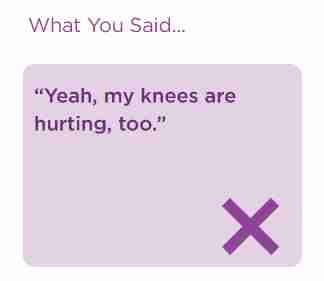
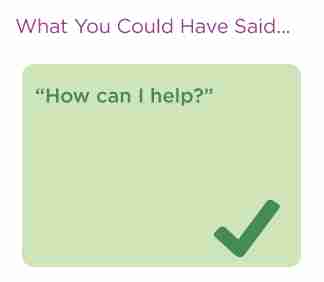
When someone with RA tells you they’re in pain, you can be sure they’re not exaggerating. People with RA frequently cope with joint pain and fatigue; most say little or nothing about it unless it’s very bad or starting to disable them. By equating your pain with theirs — which may or may not be comparable — you’re dismissing their pain and implying that they’re weak and foolish for mentioning it. Imagine how you’d feel if you were in their shoes.
But by asking how you can help, you acknowledge the other person’s pain without belittling or mocking them, or comparing their pain to yours. You’re also showing them you care and want to help if you can.
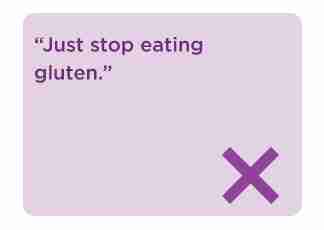
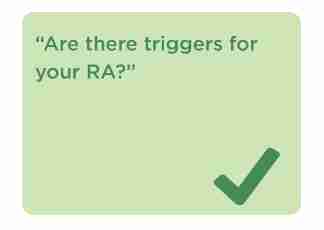
RA is a serious, systemic, incurable, autoimmune (meaning your immune cells mistakenly attack your own joints) disease. Its symptoms, such as joint pain and fatigue, are often treatable, but the disease affects each person differently. Some find that cutting gluten (or tomatoes, or refined sugar, or red meat, etc.) from their diet may sometimes help to reduce the number or intensity of their flares; others experience no change at all.
Simply assuming that the latest diet fad or fix will relieve your friend or family member’s symptoms or cure their RA is simplistic — and condescending. They’ve probably already tried just about every “cure” out there. If they haven’t, they probably have a good reason.
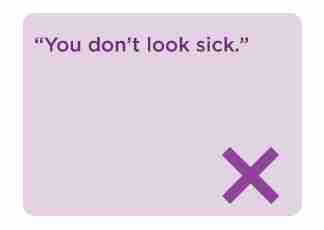

RA is an “invisible” disease. Like many forms of cancer and other progressive diseases, it generally only “shows” when it causes severe illness, fatigue, or disability, or when it visibly deforms joints. People who have RA work hard to appear as “normal” as possible. Like anyone else, they take pride in their appearance. But don’t assume that because they don’t “look sick” they aren’t sick. They are, and telling them they don’t look sick minimizes their illness and implies it’s not very serious, after all.
On the other hand, people living with RA appreciate compliments, just like anyone else. Acknowledging their illness, but telling them, with sincerity, that they look good anyway validates their feelings, boosts their confidence, and helps them feel more normal and attractive in spite of their illness and pain.
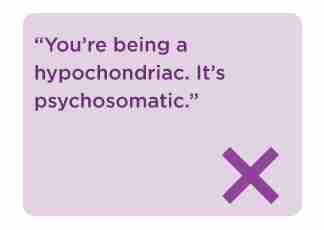

Learning about diseases like RA is much easier than it once was, thanks to the Internet. Understanding how the disease works in the body removes much of the mystery — and the fear — that comes from living with it. This is not hypochondria. This is a healthy attempt on your friend’s part to cope better and live well in spite of their disease.
A systemic, autoimmune disease, RA’s hallmark feature is that the body’s immune system attacks and destroys the healthy synovial tissues that surround the joints, tendons, ligaments, and certain other parts of the body, such as the linings of the heart, lungs, eyes, and even the vascular system. This causes inflammation and damage, which in turn causes pain that can vary from mild to debilitating. This pain — and the other symptoms RA causes, such as fatigue and malaise — isn’t imaginary or psychosomatic.
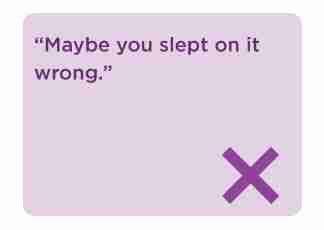
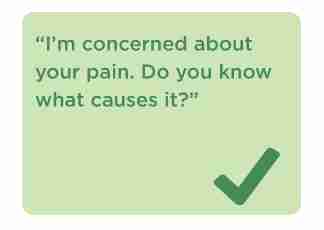
In the early days before diagnosis, most people with RA also thought they might have just “slept wrong” on an inexplicably painful shoulder, hand, or wrist. It’s a natural response to a bafflingly sudden, mysterious pain. But “sleeping on it wrong” isn’t what causes RA stiffness and pain.
By asking your friend or family member what does cause it, you open up an opportunity for them to explain what’s actually causing their pain. You’re showing your concern and validating them.
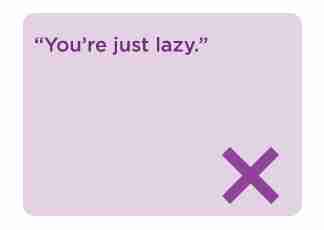

Accusing a person who copes with RA every day of being lazy is simply mean-spirited, ignorant, and hurtful. RA symptoms are often severe. They can cause disabling pain and exhaustion. People who have RA try to live as normally as possible by treating their disease and working hard to accomplish as much as they can in spite of it. But the fact is that RA is often intractable. The only option may be rest.
By saying “I know how hard you’re trying,” you’re supporting and validating the effort they’re making to cope. Being unable to do as much as everyone else is frustrating and often demoralizing. Your friend or family member really is doing the best they can. If you were in their shoes, could you hope to do as well?
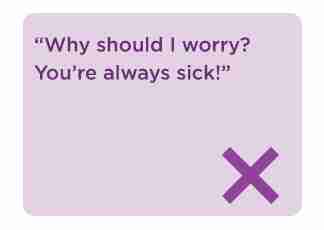
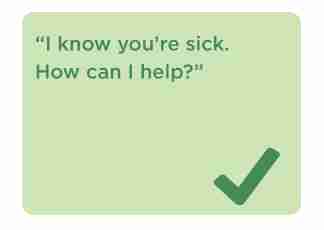
A person who’s ill and in pain needs companionship, support, and understanding. By asking how you can help, you’re doing all three, and showing your concern about them as well.
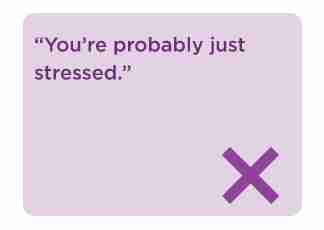

Coping with pain, stiffness, fatigue, malaise, and concern over an uncertain future is stressful. Stress causes our brains to release adrenalin, which in turn tightens up our muscles, sharpens our senses, and makes the heart beat faster. Without adequate release, or when the stress is chronic, the body’s involuntary response to stress may become harmful. Stress can cause high blood pressure, increase the risk of heart attack or stroke, suppress the immune system, and cause mental or emotional problems.
Stress can trigger RA symptoms in some people, and can sometimes make symptoms worse. But relieving stress won’t make RA go away. Telling your friend or family member that you understand their stress can be a good start in helping them cope with it. Offer your help wherever you can, encourage them to talk about their RA, their symptoms, and their hopes and fears. Most of all listen — and make sure they know you care.
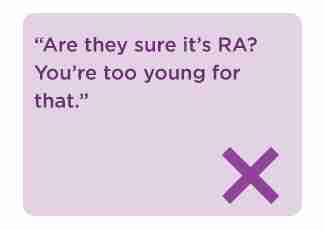
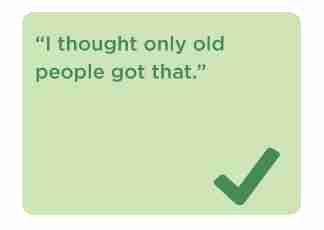
Many people mistake RA for osteoarthritis, a common joint disease that generally strikes late in life. RA can strike at any age. Even infants get it. But on average, it starts between the ages of 30 and 60, and women get it almost three times more often than men.
Both diseases are incurable, but OA is more successfully treatable.
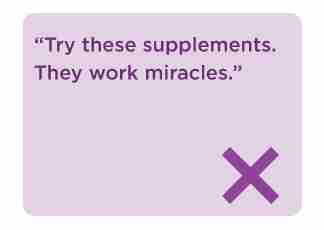

While there are a million purveyors of supplements out there who claim that their products miraculously relieve RA pain or even cure the disease, none can back their claims up with credible scientific proof. Your friend or family member has probably tried most of the supplements you can think of — and then some — with no effect on anything but their wallet.
In addition, they’re probably taking powerful drugs for their RA. Supplements could interact badly with them, so your friend probably won’t want to try them without their doctor’s approval.
Instead, ask about their current treatment to show that you understand that this is a serious disease, one that isn’t going to miraculously go away after taking some dubious concoction.
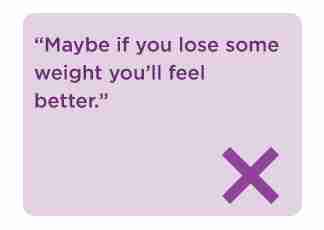

If someone with RA is overweight or obese, losing some weight might relieve stressed weight-bearing joints or make them feel better overall. But weight loss doesn’t ultimately cure RA — it’s an equal-opportunity autoimmune disease.
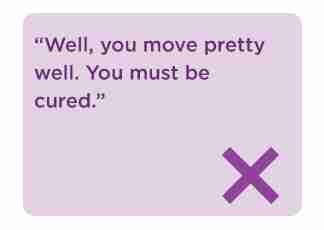

There is no cure for rheumatoid arthritis. Its symptoms are unpredictable. Flares come and go without warning. The disease might go into “remission,” or a period of very low disease activity, for days, weeks, or even months. This can make someone with RA feel less pain and malaise, have better stamina, and be able to do a lot more than they could before.
By acknowledging this positive change, you’ll help lift their spirits and encourage them to keep trying. You’re also showing them that you’re aware of their illness, that you’re concerned, and that you care. Finally, your acknowledgement opens up a positive dialogue about the disease, its treatment, and their hopes and aspirations for the future.
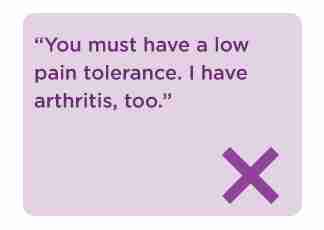
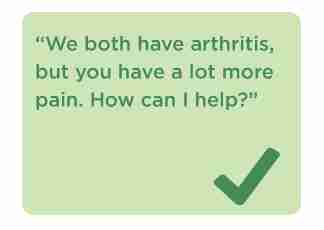
Never compare pain perceptions. This negates and minimizes your friend or family member’s RA pain — a thoughtless thing to do. The perception of pain depends on a variety of factors, including our overall health. It depends on whether we’ve slept well or not, whether we experience pain frequently, what medications we take, and a slew of other circumstances. If you could feel it yourself, your friend’s pain might be so agonizing it immobilizes you. Yet they’re still moving, talking, interacting, and participating, even if they might be doing it a bit slower than you are. Acknowledge that their pain is as real as your own. By asking if you can help, you’re showing your concern and willingness to lend a hand.
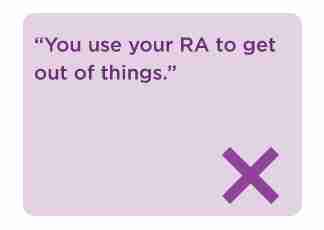

One of the most frustrating, aggravating things about RA is its unpredictability. One moment, your friend or family member feels good, full of energy, and ready to take on the world. The next, pain and fatigue have knocked them flat. This can happen within a single hour. RA flares can hit suddenly, randomly, and with intensity.
It means your friend may have to cancel plans, which at the very least, is embarrassing, discouraging, and frustrating. No one likes to sit at home when everyone else is out having fun. Telling them they’re just using their illness to “get out of” attending is low and mean-spirited, and both mocks and negates the serious disease they live with 24/7.
By offering an option for a get-together at some other time, you’re acknowledging their illness, assuaging their guilt, and helping them cope with their disappointment. Believe them when they tell you they want a rain check!
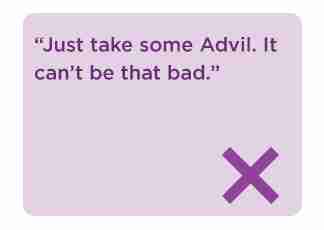
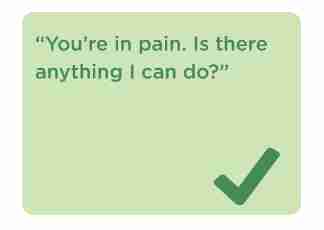
If Advil were all someone with RA needed to take to find relief, they’d be taking it routinely. You wouldn’t have to suggest it. Rest assured that your friend or family member has probably already tried it without success, or is unable to take it for some reason.
In addition, you really have no idea how bad your friend or family member’s pain is. Saying something like “it can’t be that bad” is a complete negation of their very real, sometimes excruciating pain. It implies they’re faking or overreacting to their pain. It says you don’t care about how they feel, only about how you feel. If that’s the best you can do, why say anything at all?
Instead, acknowledge their pain as real. By asking if there’s anything you can do, you’re showing your support and encouragement. You might even be able to help.